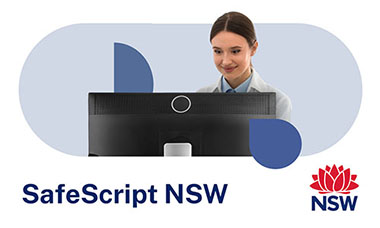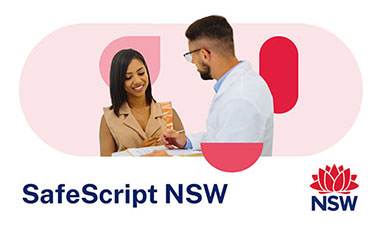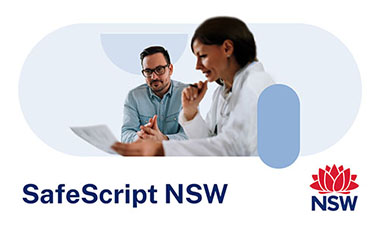
This module provides an overview of SafeScript NSW – the New South Wales' Government's real-time prescription monitoring system. It provides you with an opportunity to update your knowledge on the increasing harms from high-risk prescription medicines, and to learn how SafeScript NSW provides additional information to assist with clinical decisions when prescribing or dispensing high-risk medicines. The module also outlines ways to manage and maintain patient privacy when using SafeScript NSW, and the key regulatory requirements relating to use of the system.
Developed for the Department of Health, NSW.
Cost: Free
Target audience: Pharmacists practicing in NSW
CPD points: For pharmacists – accredited by APC, for prescribers – self-directed CPD. Click here to view details

This module provides you with an opportunity to reconsider how you manage safety concerns about patients with prescription medicine dependence or those showing signs of high-risk use. It explores planning approaches for the consultation, strategies for the practice and collaboration with other health professionals, and provides you with an opportunity to review available management and treatment options. The module will refresh your knowledge of alternative options for managing chronic pain, anxiety and insomnia, including non-pharmacological approaches and other lower risk pharmacological treatments. It will also outline the key steps involved in prescribing medication-assisted treatment for opioid dependence (MATOD) for patients with opioid dependence.
Developed for the Department of Health, NSW.
Cost: Free
Target audience: Pharmacists practicing in NSW
CPD points: For pharmacists – accredited by APC, for prescribers – self-directed CPD. Click here to view details

This module provides you with an opportunity to reconsider how you manage safety concerns about patients with prescription medicine dependence or those showing signs of high-risk use. It explores planning approaches for the consultation, strategies for the practice and collaboration with other health professionals, and provides you with an opportunity to review available management and treatment options. The module will refresh your knowledge of alternative options for managing chronic pain, anxiety and insomnia, including non-pharmacological approaches and other lower risk pharmacological treatments. It will also outline the key steps involved in prescribing medication-assisted treatment for opioid dependence (MATOD) for patients with opioid dependence.
Developed for the Department of Health, NSW.
Cost: Free
Target audience: Pharmacists practicing in NSW
CPD points: Self-directed CPD. Click here to view details

Developed for the Department of Health, NSW.
Cost: Free
Target audience: Pharmacists practicing in NSW
CPD points: For pharmacists – accredited by APC, for prescribers – self-directed CPD. Click here to view details